#low saxon
Text
Dear means 'valued; precious; beloved'. However, in certain expressions it also means 'expensive', such as in to cost dear. This meaning, inherited from Proto-Germanic, became dominant in cognates of dear, such as Dutch duur, German teuer, and Swedish dyr. The infographic tells you the whole story.
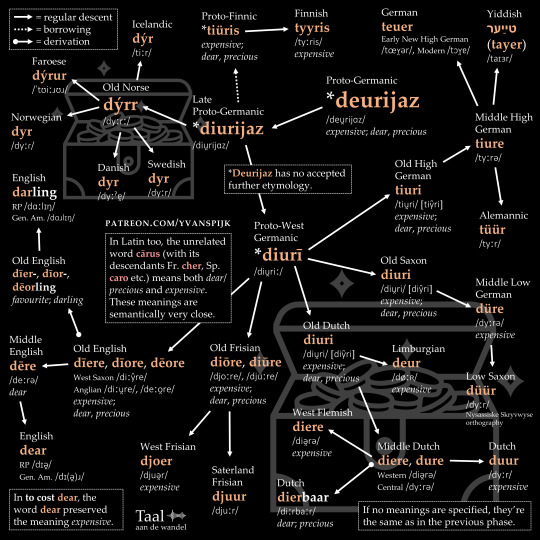
#historical linguistics#linguistics#language#etymology#english#dutch#german#low saxon#frisian#old frisian#old saxon#old high german#old english#old dutch#middle high german#middle dutch#middle english#middle low german#lingblr#proto-germanic#proto-west germanic#yiddish#west flemish#limburgian#saterland frisian#faroese#icelandic#norwegian#swedish#danish
138 notes
·
View notes
Text

first year // 7 years old
#diaspora#diaspora poetry#dutch#my poetry#bad poetry#dutch diaspora#poem#poetry#diaspora blues#Low Saxon#Betuwe#Nijmegen#ww2#generational trauma#second language
1 note
·
View note
Text
low german and/or english are soundwise the danish of west germanic
1 note
·
View note
Note
hello!!! sorry if this is a personal ask, but i was wondering if you would be interested in talking about some of your region's language and dialect? its difficult to find information on specific demographics and how their dialects relate to the language overall, and im also in a lot of trouble with the german teacher crime syndicate and if i remain unable to roll an r they might get me - anon
Not personal at all! I'd love to talk about my dialect and I'm holding back from writing a whole essay about it rn :'D
If your German teachers make you roll your r they're either trying to make you sound Southern* or they're not even trying to teach you the uvular r. Neither one of these options is ethical. Standard German (TM) doesn't include rolled r sounds, the uvular r is way more common! I hear it's hard for Anglos to do, but just think of the k and g sounds - they get your tongue in the right position for that guttural non-rolled r :) (check this video, it explains pretty well)
I'm a Saxon speaker. This dialect has the same unfortunate connotations as deep Southern or Midwestern US accents; uneducated, bigoted, small-minded and all that, and it's considered unprofessional to speak it on the job (top 10 things that make me yearn for violence btw).
Anyway. Saxon my beloved!! It's very laid-back and fun. Whimsical, even. Your tongue kinda just stays at the back of your mouth, pronunciation is incredibly lazy, soften all the consonants. Since it's a Middle German dialect and not a High German one, some words are closer to English, too! Apfel becomes Appel, for example.
Saxon is also universally used when ppl satirize/mock East Germany or the entire region ig even though the dialects here are super diverse, too. And I'm not even from the state of Saxony but whoever drew the new state lines after the reunification had to have been WASTED cause wtf is Sachsen-Anhalt?? Whenever I open my mouth ppl just clock me as Saxon or maybe Thuringian but NEVER as Anhaltian.
Hope this helps, feel free to ask more! Good luck with your teachers 💥💥
#* some low german dialects around the baltic north sea coast also roll the r#and another thing: you can tell if someone is saxon even when they're speaking english#it's so strong it's wild#german stuff#ask
53 notes
·
View notes
Text
I think Lucy and the master met at some boring rich people dinner where he (genuinely annoyed) made some passably polite backhanded comment to someone and she couldn’t stop herself from giggling which distracted him by making coming up with clever insults a game to see how much of a reaction he could get from her & lighting his mood considerably— making him much more charming and flirty when she confronts him about it after
#I think she makes some faux-exasperated comment about him being rude and asks why he puts up with them at all if he hates them so much#and he responds with a suggestive (and incredibly low hanging fruit) of there being upsides to it — like her#the keep running into each other from there and he keeps up the game it’s just a way to pass the time.#until they’re alone on a balcony together and she has stars in her eyes about something he said or did and it’s not just a game anymore#zap.txt#simm!master#lucy Saxon#I dunno!!!! I dunno. one wonders what would drive a woman to make the choices she did#and I think at one point he simply was worth it
8 notes
·
View notes
Text
afew days ago I went to an english language bookshop and the place was like 50% bernard cornwell books. at one point I took some of them and arranged them from best to worst according to goodreads. for some reason one of the sharpe books had modern anti-aircraft missiles on the cover. there were also 10 identical copies of kidnapped sprinkled throughout the shop which had as their cover art a mediterranean looking island. it was an experience
#was pretty close to getting one of his anglo saxon books#or maybe gallows painter or whatever it was called#but it seems my tolerance for mr cornwell's prose is. low#echo
16 notes
·
View notes
Text
hi if you need me i'll be in the "how to write this language (on this wiki)" sections of small wikipedias in language varieties with no official orthography <3
7 notes
·
View notes
Text
so I’m researching west frisian and dutch low saxon rn and man I fucking love language
#I love you phonetics I love you dialects I love you preservation of endangered languges#browsing through the page on west frisian in frisian (which I don’t speak but can understand fairly well apparently) and reading it out loud#I’m definitely not getting everything right but I’m having fun#and also the phonetics part on the dutch low saxon page. how have I never realised that ol diphtongated (?) to ou#elli rambles#about the dutch lower saxon it’s like. I don’t speak it but my autistic ass tends to accidentally pick up accents/dialects#which is why I say stuff like mossekieke (instead of moet je kijken) bakkie pleur (bakje koffie) or zuurbrand (maagzuur)#despite only really speaking standard dutch#languageposting
8 notes
·
View notes
Text



Word for today: frithstool
A low stone chair that, if I’m understanding Anglo-Saxon law correctly, made it illegal to attack or arrest anyone sitting in it.
3K notes
·
View notes
Text
Spring Equinox Masterpost- Spoonie Witch Friendly
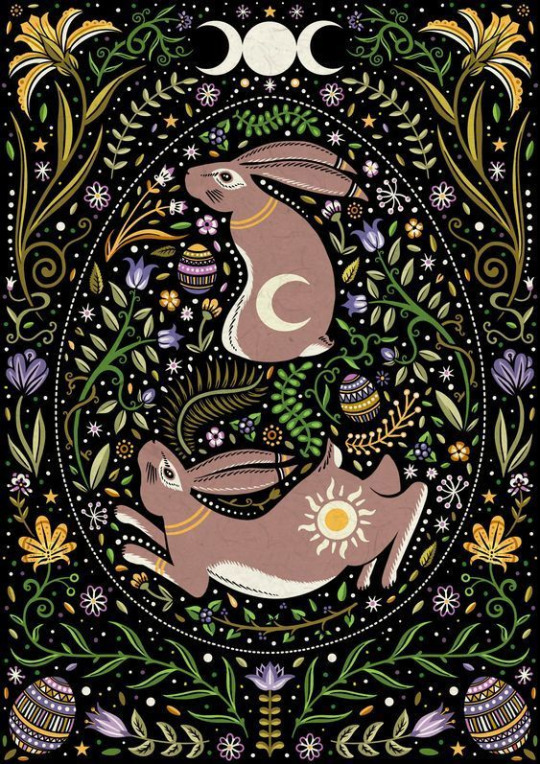
Art Credit: Anastasia Catris
The Spring Equinox, also called the Vernal Equinox or Ostara, is usually celebrated between the 21st of March in the Northern Hemisphere (In the Southern Hemisphere around September 20th or 21st)
In 2024, Ostara and the Spring Equinox land in the Northern Hemisphere on Monday, March 19th.
The Spring Equinox celebrates the arrival of spring. Celebrating balance, growth, and new beginnings as Winter has finally ended.
Spring Equinox Correspondances
Colours
Light Green
Lavender
Sunny Yellow
Light Blue
Pastel Pink
White
Herbal
Lemongrass
Daffodils
Tulips
Violets
Apple Tree
Cherry Blossom
Primrose
Birch tree
Hyacinths
Dandelion
Garlic
Ash tree
Jasmine
Edibles
Honey
Salad greens
Spring veggies
Fresh berries
Mead
Herbs
Eggs
Seeds
Bread
Edible flowers
Quiches
Custards
Maple
Animals
Hares
Baby Chicks
Snakes
Robins
Bees
Butterflies
Phoenix
Ram
Crystals
Fluorite
Moonstone
Silver
Aquamarine
Clear Quartz
Amazonite
Symbols
Bonfires
Flowers
Rabbits
Eggs
Seeds
Baskets
Flowering or Tree Buds
Lambs
Birds
Spiritual meanings
Purification
Cleansing (removal of stagnant energy)
Growth
Transition
Motivation
Balance
Birth
Good fortune
Kindness
Joy
Fertility
Scents
Coconut
Citrus
Floral scents (rose, lilac, jasmine, etc)
Herbal scents (rosemary, basil, mint, etc)
Gods / Goddesses / Spirits
Eostre – (Anglo-Saxon)
Aphrodite - (Greek)
Gaia - (Celtic)
Gaea - (Greek)
Venus - (Roman)
Athena - (Greek)
Aurora - (Roman)
Eos - (Greek)
Isis – (Egyptian)
Freya - (Norse)
Persephone - (greek)
Cybele - (Roman)
The Green Man - (Celtic)
Odin – (Norse)
Osiris – (Egyptian)
Pan – (Greek)
Thoth – (Egyptian)
Adonis – (Greek)
Apollon – (Greek)
Apollo - (Roman)
Need some suggestions to celebrate? I've got you covered.
High energy celebrations and ritual
Deep cleaning of the hearth and home
Nature hikes
Visiting farmers markets
Making preserves
Create a fae garden
Create a seasonal altar
Abundance/Prosperity ritual
New beginnings ritual
Low energy celebrations
Wear pastels
Create flower crowns
Light a candle with scent correspondence
No spoon celebrations
Opening a window
Journaling Prompts
Keeping hydrated
Drink floral tea
Rest
How you celebrate the holiday does not matter. You can choose to do any activity that feels right. These are only suggestions and remember that you're enough no matter what.
Also please note some stuff is UPG. A great book is Year of the Witch by Temperance Alden for honouring the celebrations and if you wanted to work more seasonally. It's not Wiccan-based and has plenty of resources for every witch.
Feel free to post how you celebrate in the comments or reblogs!
Want to see more of my posts? Check out my Wheel of the Year Masterpost or my Main Masterpost.
#witchcraft#witch#electic witch#witchblr#paganism#spoonie witch#spoonie magic#ostara#wheel of the year#witchy#spring equinox#seasonal magic#ostara masterpost#ostara correspondences#spring equinox masterpost#spring equinox correspondances#spoonie#chronic illness magic#chronic illness
944 notes
·
View notes
Text
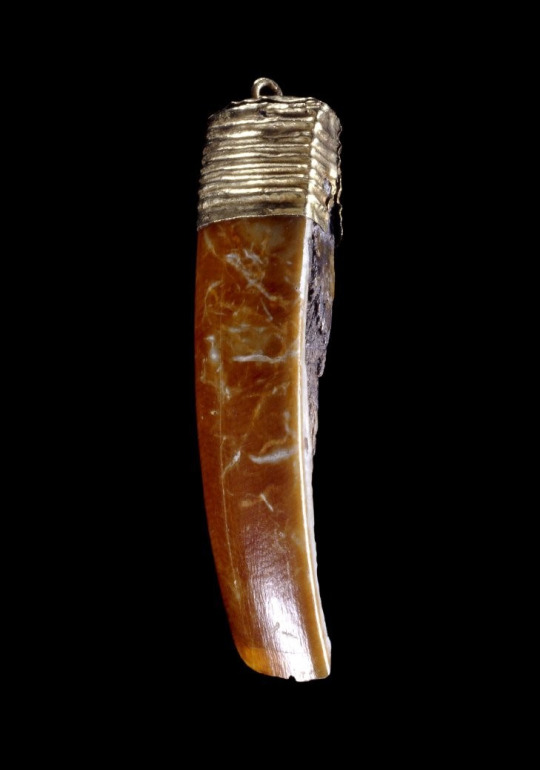
An Anglo-Saxon beaver tooth amulet discovered at the Wigber Low burial site in Derbyshire.
A 6th-century Anglo-Saxon riddle describes the beaver:
I am a dweller on the edge of steep stream banks, and not lazy at all, but warlike with the weapons of my mouth.
I sustain my life with hard labour, laying low huge trees with my hooked axes.
I dive into water, where the fish swim, and immerse my own head, wetting it in the watery surge.
The wounds of sinews and limbs foul of gore I can cure. I destroy pestilence and the deadly plague. I eat the bitter and well-gnawed bark of trees.
The Eurasian Beaver was hunted to extinction in Britain by the 16th century; since 2009, there has been an ongoing project to reintroduce them in Scotland.
#no idea there'd ever been beaver in Europe#no wonder they were so stoked to find more to kill in the New World#shiny objects#anglo-saxons#archaeology
291 notes
·
View notes
Text

The word Lent, which denotes the Christian abstention period of 40 days preceding Easter, used to be the default word for springtime. Its Dutch cognate lente still is the word for 'spring', while German Lenz is now archaic. They all come from a word meaning 'long-day'.
#historical linguistics#linguistics#language#etymology#english#dutch#german#old high german#middle high german#middle dutch#old dutch#low saxon#old saxon#middle low german#middle english#old english#proto-germanic#proto-west germanic#lingblr
97 notes
·
View notes
Note
Hello from the other side of the world. Could you share a little about hiraeth? It's okay if not, I know you said it was hard to explain, but I'm guessing the Wikipedia article is, ah, very simplistic.
What was the feeling that made it silent like a church? Introspection? Was it because of the specific music of tha song, or is the subject of hiraeth always this impactful?
Sorry if this is dumb or insensitive or something, I really know next to nothing about Welsh culture (my country wasn't even invaded by the British Empire, if you can believe it), but that part of the story really stood out to me, and the way you explained it so casually to your friend and he seems to have just understood makes me feel like I'm missing a very big piece of context.
Anyway, thanks for sharing your adventures and shenanigans with us, and it's okay if this is too complicated for right now.
The number of places Britain didn't try to colonise is so low that makes you a unicorn, I think. Congrats!
Happy to explain though, no worries. Part of it is the song itself, which is worth a listen to get the vibe; I do mean a bit of a hush fell over the moderately busy restaurant. It's got hella vibes.
But yes, hiraeth is a very important concept in Welsh. The best translation is 'homesickness', or maybe 'yearning', but it's more complex and nuanced than that. Sort of hard to explain. I've seen it used to describe the urge Welsh people get, when they've been away from Wales for too long, to reconnect; to journey back and climb a mountain and look down into the valley and let your soul heal. I've seen it described as the feeling of bone-deep belonging, the sense of coming home that some people feel who visit Wales for the first time, and find it speaks to them. The land reaching out for the soul, the mountains into the mind. That's hiraeth.
(There's a poem that turns up on Welsh tourist tea towels a lot, no idea where from, but it sums it up as: "To be born Welsh is to be born privileged. Not with a silver spoon in your mouth, but with music in your blood and poetry in your soul.")
I've also seen it described in internet memes as "longing for a home you can never return to", which in typical Anglophone fashion, is almost right while fundamentally misunderstanding and stripping away the most important part. Because it's the longing for a Wales we can never return to. The version of our past, without English occupation, that can never exist again. Thanks to Wales having had a fairly complex cultural and historical makeup, we were not unified as a single country until after English occupation; plenty of unified elements existed before that (uniting under a dragon to drive out the invading Saxons, for example), but not what in the modern day we'd understand as a country. But we ARE a country now; so it's a sort of shared dream. The country we could have been, should have been, can never be. The lost version of us.
That's hiraeth. It's all hiraeth. And it's all specifically Wales.
504 notes
·
View notes
Note
So I noticed something interesting linguistically during my Spanish lessons but then I couldn't find a reason why and thought maybe you would have an idea?
Why does the word 'German' change so much from language to language? I mean you said Deutsch but we say German. But then in Spanish, it's Alemán. That's a massive change across three language. And I know they're from different language families but it still seems like a big change, I wonder why
I mean...yeah, it's kind of a situation
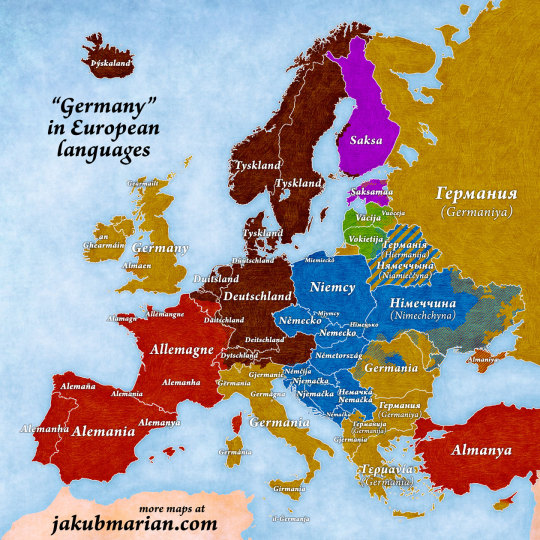
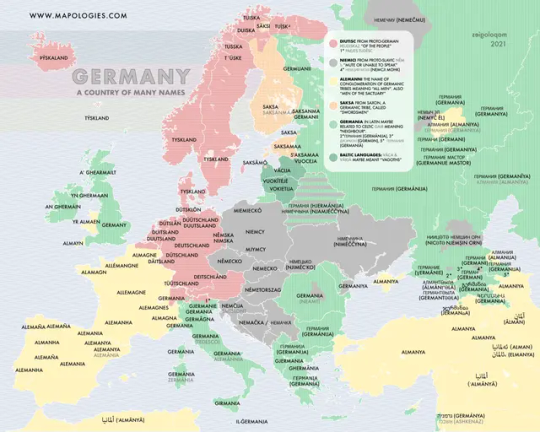

The thing is, Germany was only united as a single country in 1871. Before that, it was really a conglomerate of many different small cities, dukedoms, and kingdoms under the Holy Roman Empire (and before that: Tribes)
Modern-day Germany was just beyond the edge of civilisation during ancient times - Everything to the west and South, including France and England, was conquered and named and cartographed by the Romans but Germania was what was on the "other side":
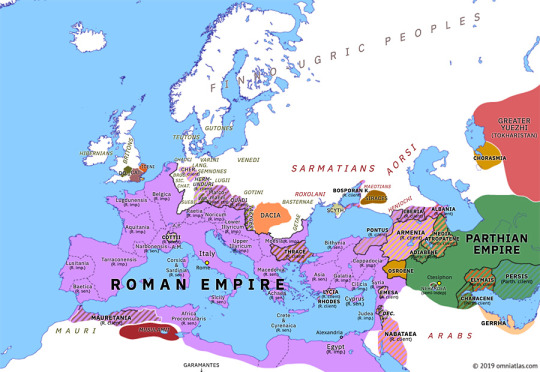

The beige part was where civilisation ended for the Romans. Everything beyond the Limes was barbarian woods and most attempts to conquer there ended in military disasters like the battle of the Teuteburger Forest so ...not much progress was being made.
The name "Germania", that was used for EVERYTHING beyond the Limes border was apparently adopted from the word the Gauls used for the peoples they knew were living right there on the other side - and which meant something like "people of the forest" or possibly "neighbours" (which means the Romans might have done that ancient thing where they asked the Gauls: "Who lives over there?" and the Gauls were "Oh, yeah, those guys are our neighbours who sometimes come to our markets and that we fight with sometimes and who talk a little weird" and the Romans were like: "Ah, so the name of everyone living in the great beyond is 'Neighbours' and just stamped that name on a large chunk of the continent full of people who had never met a Gaul and had never heard of the word "Germania")
And because that area wasn't centralised the way the former colonies of Rome were, this pattern continued - when "states" (there was no modern-day statehood then, I guess the closest word would be "Reiche" but that would be Empires in English but that also doesn't describe it accurately and Reich has a Connotation in English and kingdom suggests a kind of continuity that didn't exist yet...) interacted with the people who lived in these lands, they often falsely assumed a level of social cohesion that didn't exist. One example is when Charlemagne pushed East, he would often make deals with the pagan Saxon tribes to please stop raiding all the nice monasteries he tried to establish - but it happened again and again, and people at the time concluded that the Saxons simply didn't honour their word. The problem was, that the Saxons were not united under one ruler and were not one cohesive tribe - so just because one of them made a deal to stop raiding monasteries, this doesn't mean anyone else got the memo or felt obliged to stop plundering those monks.
Even today, this kind of happens: Like "teutonic" being used for "german" because Teutons were a German tribe or people identifying Germany with Bavaria bc they hear a lot about the Oktoberfest or "Prussian" and "German" being equated because between 1871 and 1918, the Hohenzollern, being both the royal House of Prussia and the Kaiserhaus, largely dictated Germany's foreign policy and impression to the rest of the world, and even before that posing the biggest counter-weight to the Austrian/Austro-Bavarian role on the German-speaking playing field and often symbolising the different cultures (e.g. protestant vs catholic) existing across the German-countries-minus-Switzerland.
And this is also how the name thing happened: "Deutsch" just means "of the people" and was largely used for the language (hence "Dutch", being a very similar language to German, also having that very similar name, except, since they were the "Low Countries" (flat as a pancake land) of the Holy Roman Empire, they eventually took that name for themselves and their language when they became independent - the Netherlands speaking nederlands, while Belgish dutch-speakers speak "vlaams" after the region "Flanders") But since Germany never "separated" from the Holy Roman Empire but is largely considered its successor, there was no reason to make a regional name the name for a new nation. It just remained "the nation/the people".
Over the centuries, the other countries usually took whatever name there was for the regional tribe of Deutsche/people they dealt with and applied that to the whole thing: If you dealt primarily with the Alemanni people, you would use a word like the French "Allemagne", the English lived on an island and mostly kept using the Latin name "Germania" - which became "Germany". In Finland and Estonia it's "Saksa" and "Saksamaa" because being in the East, they mostly dealt with Saxons.
This also turned into an international game of telephone eventually: People who didn't have much contact with different kinds of Europeans would just pick up whatever name the people they dealt with used for Germany. If you had a lot of contact with the French or Spanish, you would pick up a variation of "Alman", if you dealt primarily with the English or Italians, it would be a variety of "Germania"
Then you have countries like Japan, which entered international exchange very late and had a lot of contact with Dutch and German speakers - which is why they say ドイツ - "doitsu". In Mandarin it's "Déguó" - guó meaning "land" and "Dé" for Deutschland.
Then there is also the language barrier: The modern nation-states of Germany and Italy both were once part of the Holy Roman Empire and neither had a standardised language (even today, on the European continent, Germany and Italy might take the prize for the most variations of their own language on the home continent) or considered themselves "German" or "Italian" until very late. So they distinguished between the people who spoke all the variations of their own language and those people above/below the Alps who were absolutely incomprehensible to them due to speaking an entirely different language family - so the Italians also spoke of "tedesco", which is related to the word "deutsch". (Italy cleverly spared itself most of this chaos by not having a lot of neighbours to begin with).
Another language barrier issue was in the East, because that's where Germanic languages and Slavic languages meet. This meant that while everyone who was part of the German(ic) dialect family could communicate with their neighbouring towns and tribes and everyone on the Slavic side could communicate with their neighbouring towns and tribes, they were also faced with those weirdos from the other side of the language barrier who were speaking absolute gibberish (or maybe just stared at you like an idiot and said nothing when you asked them a basic question) That's why in many Slavic languages, the name for "Germany" is a variation of "Niemcy" or "Německo" - which means "mute" or "non-speaker" or "foreigner" - because those were the people they couldn't talk to. Vācija, Vokietija, and Vuoceja also work this way)
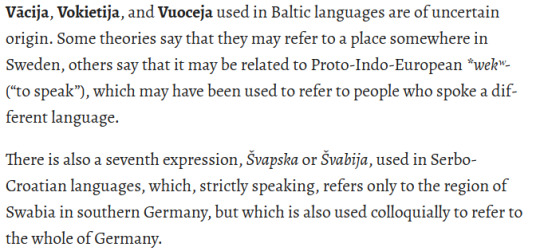
Meanwhile, in Germanic languages, it's often names that also incorporate the word "deutsch & land"- Duitsland, Tyskland, Deytshland, Däitschland, Þýskaland etc
(I think to do the language diversity and mutual communication argument some justice, I think it's also important to point out that there wasn't a lot of personal mobility for the average person at the time, so they probably also identified themselves by what little they saw of the world. If even today there are German-speakers that don't understand each other, that issue was bound to be amplified by 1000000 at a time with no standardised writing, no mobility, a thin population, small towns etc. So even if everyone between the furthest North-East of the Germanic language continuum and the lowest South-West could maybe somehow communicate with their respective neighbouring towns and tribes in pre-nation times, if you had snatched two peasants from the respective ends even of what is today Germany and sat them down on the table in the middle, there probably would have been to have even the most basic conversation or know that the other person spoke a variation of the same language - there is an old saying that "a language is a dialect with an army" - and for German, it's more "a dialect-continuum with a bunch of armies fighting each other until eventually, they got 1 army 2000 years late". Meanwhile for the educated, the lingua franca at the time was Latin.)
Now, a lot of countries ...well, eventually became countries. Which meant they could do some marketing of their own and establish their own name for themselves - but Germany, as I mentioned, was only united in 1871. Even if they considered their language "deutsch", they didn't consider themselves "deutsch" for a long time (and when they did, it was considered a radical idea) and as such, there was no centralised government saying "We are deutsch" the way the French kings said "We are French" or the English kings said "We are English" - in fact, the central authority until the early 19th century was the Holy Roman Empire. Their rulers considered themselves the successors of the old Roman Emperors - this was called the "translatio imperii" according to which Charlemagne was the first "new" Emperor" and the Empire continued until Franz II was forced to abdicate bc of Napoleon. Eventually, it was officially considered "Das heilige römische Reich deutscher Nation" - "the holy roman Empire of the german nation" - but that wasn't really a central aspect of anyone's identity.
The average person just identified by whatever colour their personal patch on this map was:

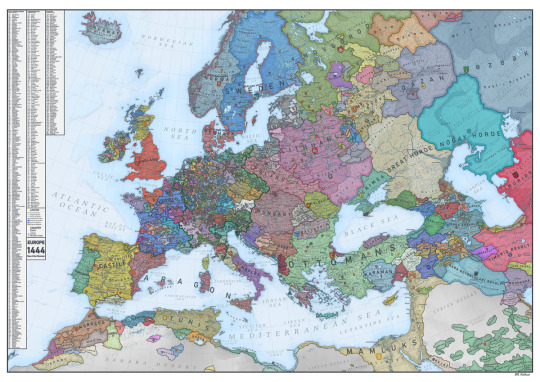
#InOurFlickenteppichEra
So no one really challenged to disagreed with someone speaking of them as "Saksa" or "German" and that's pretty much why everyone has a different name for Germany.
335 notes
·
View notes
Text
Tumblr, We Need To Talk
So multiple times now, posts that I have written, completely free of any sense of anger at all, have been interpreted by folks here - not just as angry - but as malicious. It has now happened enough times that we need to address the biases at hand here.
I am three things that are relevant for this discussion: I am Jewish. I am Italian. And I am Scottish.
These are three cultures that feature "loudness" as a positive trait. What do I mean by that?
I mean arguing, debate, discussion at my home growing up was louder than a kindergarten field trip to the zoo. Louder than a metal concert's mosh pit. Louder than the conure room at a bird shelter.
I am a loud, boisterous person. That's just who I am. With those three cultural backgrounds, I can't even help it. On more than one occasion, someone has interpreted my tendency for the dramatic, my eagerness, and my enthusiasm as being "too much". In fact, it is quite a point of trauma for me, the number of times that specific rejection has occurred.
But to me, I wasn't doing anything wrong! I was acting as my family acted, as people from my culture acted, as those around me in other situations acted. In Judaism, arguing is even seen as emotion-free, because interpersonal debate is how we learn and grow. Even the most stringent and austere Jewish groups will feature a loudly arguing table of scholars in the Beit Midrash. Italian dinners are filled with singing and shouting for joy. Being Scottish means yelling at everything and then yelling at it again. This was, and is, my life. It was loud. It was emotional. It was excitement.
Online, tone indicators are even worse, with many people easily being misunderstood in a given situation. Hell, there are probably those of you reading this now who are reading a higher level of emotion and anger into my words than is actually there. That added complication has now lead to multiple occurrences of this misunderstanding.
This isn't limited to the cultures I come from, of course! The anger and excitement and enthusiasm found in Black culture has been weaponized against it for as long as racism has existed (y'all can ask @ladyraekingmaker more about that). In fact, lower class Black Women in the United States were often perceived negatively for being loud and having their private lives carried out in public (because they did not have access to private spaces). Same for different cultural norms in other places, from Persia/Iran to parts of Latin America and more.
Indeed, loudness, anger, and tone are heavily tied to how different cultures are perceived. Calmness, stoicism, and a lack of "emotionalness" is a highlight of WASPy cultures, famously - "white anglo-saxon protestant" if you're not familiar. Being more "low key" and less expressive was considered high class, being less so was low class. And that still continues today - from the snide comments of tumblr anon's and ex friends, to the literal policing of impoverished communites of color for their celebrations and community gatherings.
The perception of emotion and passion as a "bad" thing is 100% tied to white supremacy. Full stop. In fact, policing people for being "angry" at certain things was a great way to shut down discussion of many important issues, that deserved anger - things like racism, sexism, and homophobia. Anger is a good, important, and necessary emotion - and being emotional in general is a way many people use to emphasize their own points and indicate how much they care about a subject. It's necessary, and it's good. Anger, emotion, excitement, these are good things.
It is better for someone to be angry and up front with you, allowing you to learn and grow as a person, than to bullshit you and mollycoddle you into a state of complacency.
So, that means that for many people reading this, you probably never really thought of how your reaction to loud, or emotional, or dramatic, or excitable people was related to upholding social norms. That's okay! It's not a big deal! We are all born with blind spots and things we are ignorant of that we have to understand and tackle. Growing up is something we never stop doing.
But I'm not magically going to stop being excitable, loud, and emotional. And I'm not going to magically stop being myself. While in person, my tone and facial expressions would help others to at least see that I am not mad but excited; here, you're going to have to take me at my word.
If I am angry, you will know it. It will be extremely, painfully obvious. I might even explicitly say it. But the fact remains is that, every time I have gotten (frankly, condescending) anons in my inbox telling me to "calm down", I haven't been angry at all. And that is a cultural bias a lot of you have to examine in yourselves. By policing how people - not just me - on how they talk and express themselves, you are upholding white supremacy. And you need to stop.
I am too much for some people. That's okay! If I am, you are free to go. No one has to follow me. But I am not going to minimize myself just to make some people comfortable, especially when I am doing nothing wrong. And if you continue to insist that I am, you are missing the point of this post.
Stop worshiping the empty alter of stoicism, of emotionlessness, of quietude. It's not how most humans act. And it shouldn't be, because emotions exist for a reason. That reason? Is communication.
And if you're still not convinced, just get invited to a Pesach seder. Good luck with that being anything close to "calm".
~ Meig
#emotion#logic#cultural differences#white supremacy#tone policing#not dinosaurs#this post is cosigned by my friend who is a cultural historian thanks
421 notes
·
View notes
Text
The Keel
The keel is the most important longitudinal structure of a ship or boat, attached to the floor amidships.
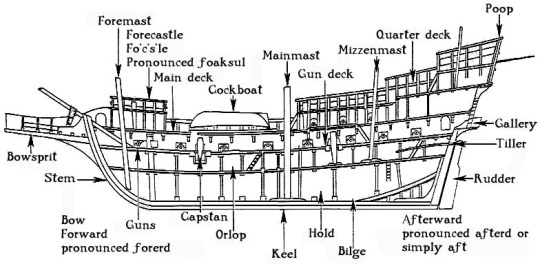
Ship parts
In terms of development history, the keel originated from the dugout canoe. The first further development of the dugouts consisted of inserting frames and raising the sides by adding plank walkways. Once this technique had been perfected, the dugout was gradually reduced in size until it was ultimately only the supporting element, the keel, of the hull. The keel is therefore the "backbone" of the ship. The transverse stabilising frames, the "ribs", are attached to it. At its ends, the keel merges into the stem. In addition to stabilising the hull, it also serves to increase course stability and - especially in sailing vessels - to reduce lateral drift.
Even if the word sounds very strange, it comes from Old English cēol, Old Norse kjóll, = "ship" or "keel". It has the distinction of being regarded by some scholars as the first word in the English language recorded in writing, having been recorded by Gildas in his 6th century Latin work De Excidio et Conquestu Britanniae, under the spelling cyulae (he was referring to the three ships that the Saxons first arrived in).
However, there are also ships that have no keel, such as flat-bottomed ships. This is a sailing ship that was mainly built for use in the mudflats of the North Sea and the English Channel. The two leeboards on the side of the hull and the extremely shallow draught of around one to one and a half metres are characteristic of flat-bottomed ships. They can navigate large parts of the Wadden Sea and coastal regions even at low tide.
#naval history#naval artifacts#parts of a ship#keel#ancient seafaring#medieval seafaring#age of discovery#age of sail#age of steam#modern
175 notes
·
View notes